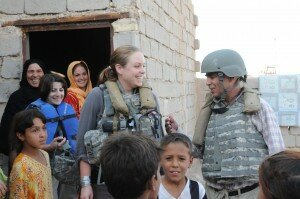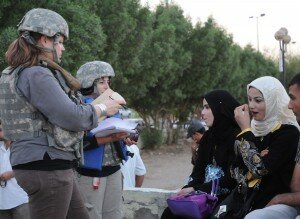Physical Address
304 North Cardinal St.
Dorchester Center, MA 02124
Physical Address
304 North Cardinal St.
Dorchester Center, MA 02124

The Smiling Face of Sociology?
Here is an article submitted by CPT Tanya Rosa of the Human Terrain Analysis Team-South, a US Army group tasked with interviewing Iraqi’s and gathering information. According to CPT Rosa, “the team is a mix of education levels, most graduate and PhD.” Say what you want about the role of the military in IRAQ, but sociology and the social sciences has an undeniable presence in the occupying armies of this world.
BASRA, Iraq – In a small town near Basra, Iraq, a team of social science researchers working for the United States Division – South are interviewing the local residents.
They ask questions such as, “What opportunities do women of Iraq have today?” and “How do you think we can help bring better education to your area?”
The team, officially known as Human Terrain Analysis Team-South, is small in number but plays a large role in the division’s efforts to assist the Iraqi people.
“We talk to the people in the community, the regular guy, the average Joe,” said Dr. David Ronan, HTAT-S team leader and 32-year Army veteran.
HTAT-S, part of a larger organization called the Human Terrain System, has been operating in Basra since 2008. The team’s mission is to provide insight into the population and its culture in order to enhance operational effectiveness and reduce civilian and military conflict.
“We try to keep our finger on the pulse of the population,” said Julianne Ivany, HTAT-S’ social scientist.
The program is not without controversy, as some academics have voiced concerns about the military using social science. However, Lt. Col. Larry Parr, USD-S deputy effects coordinator, said the HTAT specialists simply help the division assist the Iraqi populace in ways uniformed personnel can’t.
“HTAT-S does a lot of research that most U.S. Army soldiers aren’t trained to do,” said Parr. “They facilitate ways to improve what is currently going on in Iraq and what we can do to help the people of Iraq.”
For HTAT-S, it’s not just about data collection, it’s about making others understand the big picture, and it’s about getting to know new people and connecting with the population on a very human level.
“The division needs to know what people on the streets are thinking, feeling and doing,” said Ivany. “It’s fascinating to talk to local Iraqis; there is so much value in every person’s story.”
“The greatest satisfaction comes when we have a really good mission from start to finish,” Ivany added. “When we go out and get really good interviews and our reports and briefs all come together to reflect a positive effect.”
“Team Effects couldn’t do what we do and the division couldn’t do what they do if it wasn’t for their input and analysis,” said Parr. “HTAT-S is a huge asset.”
Ronan believes the team alleviates a lot of fear by creating clear understanding between US forces and Iraqis.
“Ultimately, we are saving lives,” he said.

![]() Tweet This Post
Tweet This Post
No related posts.
Posted by Dr. Michael Sosteric on September 27, 2010.
Categories: Sociologists at Work, The Lightning Strike